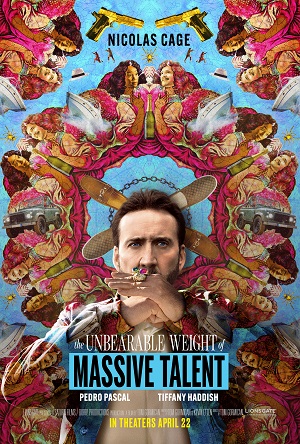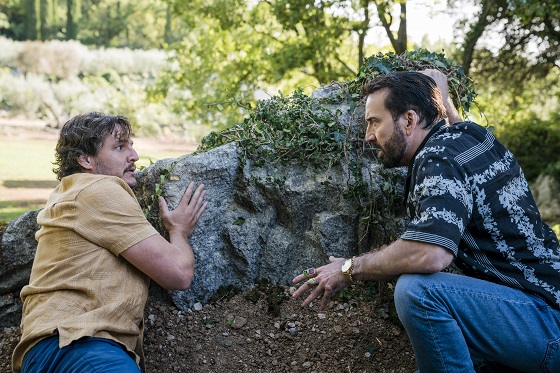

[Rating: Solid Rock Fist Up]
In theaters Friday, April 22
Rumor has it that Nicolas Cage turned down the leading role in The Unbearable Weight of Massive Talent (UWMT) several times before relenting, and while the reasons for this are obvious after watching the flick, it’s not because of what one might expect. A deeply personal and insightful exploration of not just fame and the Hollywood system, but of one actor’s flirtation with legacy and greatness, the movie cuts deep between the chuckles. Full of laughs, Cage callbacks, and Easter Eggs of all shapes and sizes, the film also benefits from a stacked cast and a 99-minute runtime that knows JUST when to stop milking the broader joke.
The movie opens with a fictionalized version of Cage bouncing between talent and agent meetings looking for the project that will bring him “back” (not that he went anywhere, as he’s keen to remind everyone). Times are tough, though, as wild spending habits, a divorce, and a string of low-rent projects have put him in a bit of a financial bind. Cage’s agent, Fink (Neil Patrick Harris), passes along an offer to appear at the private event of a Spanish superfan and millionaire, and with the actor’s familial prospects looking as bleak as his professional ones, he accepts.
To his surprise, Cage finds a kindred spirit in Javi (Pedro Pascal), the man who contracted for his appearance. The pair bond over a shared taste in cinema (especially Paddington 2) and outlook on life, which makes it exceedingly difficult for Cage when he’s approached by C.I.A. agents Vivian (Tiffany Haddish) and Martin (Ike Barinholtz) and asked to spy on Javi. The Langley spooks claim that Javi is a ruthless crime lord responsible for a recent high-profile kidnapping, and while Cage is initially willing to cooperate, he finds it increasingly difficult to conspire against his new BFF.

Exaggerated and whacky at times, sure, but the emotional bedrock of UWMT runs deep. Nicolas Cage might be the avatar for this story, but what he represents speaks to a classic, enduring Hollywood dilemma known to untold millions. Everyone in that town, from featured extras to Academy Award winners, is always out there grinding, looking for the next script or project that will get them in the mix or on the map. Director/co-writer Tom Gormican, whose own IMDb reflects just such a struggle, has injected a vein of knowing earnestness into the whole affair, and it’s this that elevates UWMT above your standard meta-humor.
Sure, we’ve seen versions of this before, both on television (The Larry Sanders Show, Extras, Entourage) and in film (Being John Malkovich, This Is the End, The Player), but this is maybe the sincerest take on the genre. Hiding behind the cartoonish spy craft and Bond-lite veneer of this story is a morality tale about family, success, legacy, and what it means to balance ambition against one’s humanity. And while there’s no shortage of films like Swingers or The Disaster Artist that detail the struggles of the unknown trying to break into Hollywood, this explores the more treacherous lane of the has-been.
It’s harder to sympathize with someone who had it and lost it, though not impossible, as seen in scenes like the one where a person comments on Cage and 1996’s The Rock, “I’ll bet you wish you were still in movies like that.” The outward response is minimal, yet the strained wince that flashes across Cage’s face in this moment and others like it serves as something of a thesis for the larger picture. And while this is a sturdy base for UWMT, the real pleasure of the picture hangs around the neck of Pascal, whose goofy fanboy energy gives life to this thing.

The script gives Pascal the green light to live as any Cage fan might, explaining how much movies like Guarding Tess and Face/Off mean to him in between tequila shots and LSD doses. It all serves as something of a best-case “meet your heroes” scenario, with Pascal (and the movie) wisely indulging in the fantasy with both hands. And while these moments aren’t limited to the Javi scenes (there’s a great Moonstruck vs. Con Air debate elsewhere), the audience has the most fun whenever he’s around.
The pull of the script’s more outlandish elements do stretch the seams of the narrative in the third act and threaten to tip the endeavor over a few times, yet the freedom afforded by the R-rating and the unchained charisma of the two leads pull it across the finish line. Gormican’s framing of the action sequences does leave a bit to be desired here and there, and the script sometimes loses track of its supporting characters, but at just over an hour and a half, such menial sins are quickly forgotten and forgiven.
At once a send-up of Hollywood, actor vanity, and celebrity culture, as well as a heartfelt exploration of success and legacy as seen through the eyes of an actor that’s been in our lives for four decades, UWMT is equal parts poignant and fun. Finding just the right balance between exciting, humorous, and insightful, Gormican and co. have crafted a fitting tribute to not just Nicholas Cage, but all the industry folks grinding in Hollywood’s wilderness.





Comments on this entry are closed.